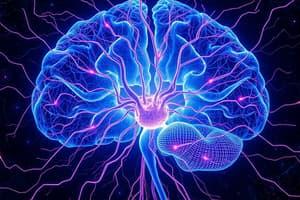Podcast
Questions and Answers
What is the primary function of the central nervous system?
What is the primary function of the central nervous system?
- Facilitate communication between the brain and the spinal cord
- Transmit information between the body and the environment
- Coordinate actions, thoughts, and emotions (correct)
- Control higher cognitive functions
Which part of the brain is responsible for higher cognitive functions like memory and language?
Which part of the brain is responsible for higher cognitive functions like memory and language?
- Cerebellum
- Cerebrum (correct)
- Thalamus
- Brainstem
What is the role of the spinal cord in the central nervous system?
What is the role of the spinal cord in the central nervous system?
- Responsible for sensory integration
- Coordinates actions, thoughts, and emotions
- Serves as the primary processing hub
- Connects the CNS to the peripheral nervous system (correct)
Which part of the brain is responsible for integrating sensory information and issuing responses?
Which part of the brain is responsible for integrating sensory information and issuing responses?
What separates the two hemispheres of the cerebrum?
What separates the two hemispheres of the cerebrum?
Which region of the brain is considered the most complex organ in our body?
Which region of the brain is considered the most complex organ in our body?
Which lobe of the brain is primarily responsible for processing visual information?
Which lobe of the brain is primarily responsible for processing visual information?
What function is associated with the Parietal Lobe of the brain?
What function is associated with the Parietal Lobe of the brain?
What is the primary function of the Cerebellum?
What is the primary function of the Cerebellum?
Which structure of the brain plays a crucial role in emotions, motivation, and memory?
Which structure of the brain plays a crucial role in emotions, motivation, and memory?
What key function is associated with the Brainstem?
What key function is associated with the Brainstem?
Which part of the brain is involved in executive functions like planning and problem-solving?
Which part of the brain is involved in executive functions like planning and problem-solving?
Flashcards are hidden until you start studying
Study Notes
The Nervous System: Exploring the Central and the Brain
The nervous system, a complex network of specialized cells that transmit information between our body and environment, is the cornerstone of our ability to perceive, think, and move. Within this system, we'll delve into the central nervous system (CNS) and the brain, two essential components that enable our cognitive and motor functions.
Central Nervous System (CNS)
The central nervous system, comprised of the brain and the spinal cord, serves as the primary processing and communication hub of the nervous system. The CNS coordinates our actions, thoughts, and emotions by integrating sensory information and issuing appropriate responses.
The spinal cord, a long, tubular structure, extends from the brainstem to the lumbar region of the spine, connecting the CNS to the peripheral nervous system (PNS). It contains nerve fibers and cell bodies that facilitate communication between the CNS and the rest of the body.
The Brain
The brain, the most complex organ in our body, consists of several regions that serve distinct functions.
Cerebrum
The largest portion of the brain, the cerebrum, is responsible for higher cognitive functions such as thinking, reasoning, decision making, memory, and language. It is divided into two hemispheres, which are connected by a band of nerve fibers known as the corpus callosum.
Within the cerebrum, there are four lobes:
- Frontal Lobe: This lobe is associated with executive functions, such as planning, problem-solving, and motor control.
- Parietal Lobe: The parietal lobe processes sensory information, particularly those related to touch, temperature, and proprioception (body position).
- Temporal Lobe: This lobe is involved in processing auditory information and memory, including the formation of long-term memories.
- Occipital Lobe: The occipital lobe is responsible for processing visual information and sending it to other areas of the brain for interpretation.
Cerebellum
Located at the base of the skull, the cerebellum is primarily responsible for motor coordination and balance. It plays a crucial role in maintaining stability, fine-tuning muscle movements, and adjusting posture.
Brainstem
The brainstem serves as a relay station between the CNS and the PNS. It contains various nuclei responsible for vital functions such as regulating breathing, heart rate, blood pressure, and consciousness. The brainstem is also home to the reticular activating system (RAS), which is involved in maintaining arousal and wakefulness.
Limbic System
The limbic system is a group of structures that are closely connected to the cerebrum and cerebellum, and it plays a critical role in emotions, motivation, and memory. Key components of the limbic system include the hippocampus, amygdala, hypothalamus, and the septum.
The human brain is a fascinating organ that continues to reveal its mysteries through ongoing research. Understanding the central nervous system and its key components, such as the brain, is essential for uncovering the inner workings of our thoughts, emotions, and physical capabilities. The Human Brain: A Fascinating World in Our Skulls - BBC Future [https://www.bbc.com/future/article/20180123-the-human-brain-a-fascinating-world-in-our-skulls] The Central Nervous System: An Introduction - National Institute of Neurological Disorders and Stroke [https://www.ninds.nih.gov/Disorders/Patient-Caregiver-Education/Understanding-Central-Nervous-System-Introduction] The Human Brain: A Journey Through the Amazing World of Neuroscience - The Royal Institution [https://www.rigb.org/discover/human-brain-journey-through-amazing-world-neuroscience] The Central Nervous System - National Institute of Neurological Disorders and Stroke [https://www.ninds.nih.gov/Disorders/Patient-Caregiver-Education/Understanding-Central-Nervous-System-Information-Page] The Brain Facts: Cerebral Cortex - Society for Neuroscience [https://www.brainfacts.org/brain-structure-and-function/brain-basics/articles/2020/cerebral-cortex/] The Brain Facts: Cerebellum - Society for Neuroscience [https://www.brainfacts.org/brain-structure-and-function/brain-basics/articles/2020/cerebellum/] The Limbic System: A Primer - Psychology Today [https://www.psychologytoday.com/us/blog/the-athletes-way/201006/the-limbic-system-primer]
Studying That Suits You
Use AI to generate personalized quizzes and flashcards to suit your learning preferences.




